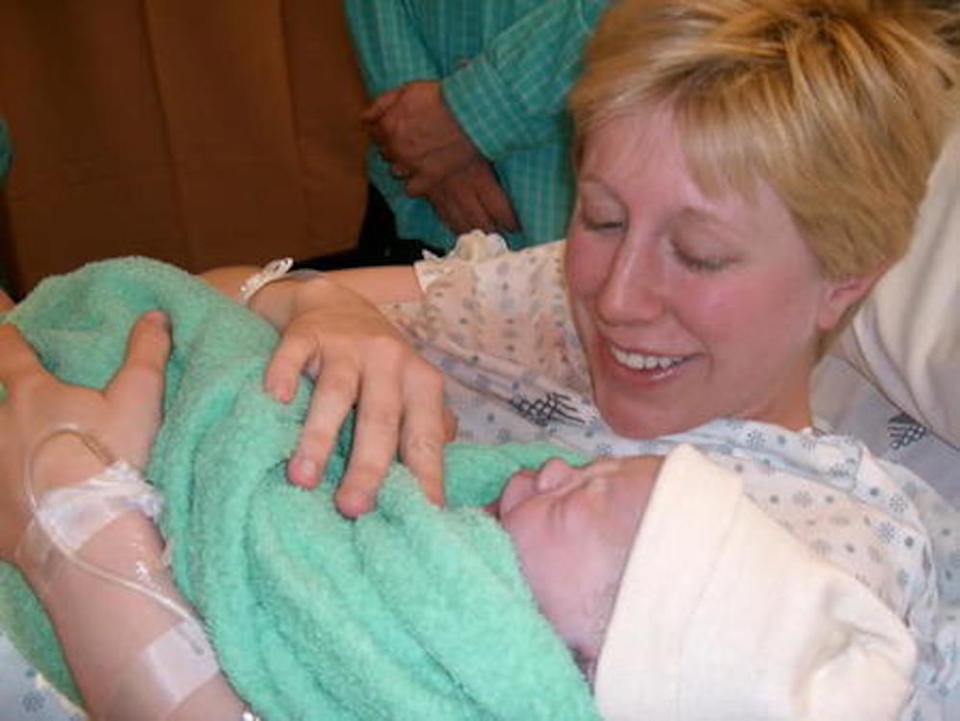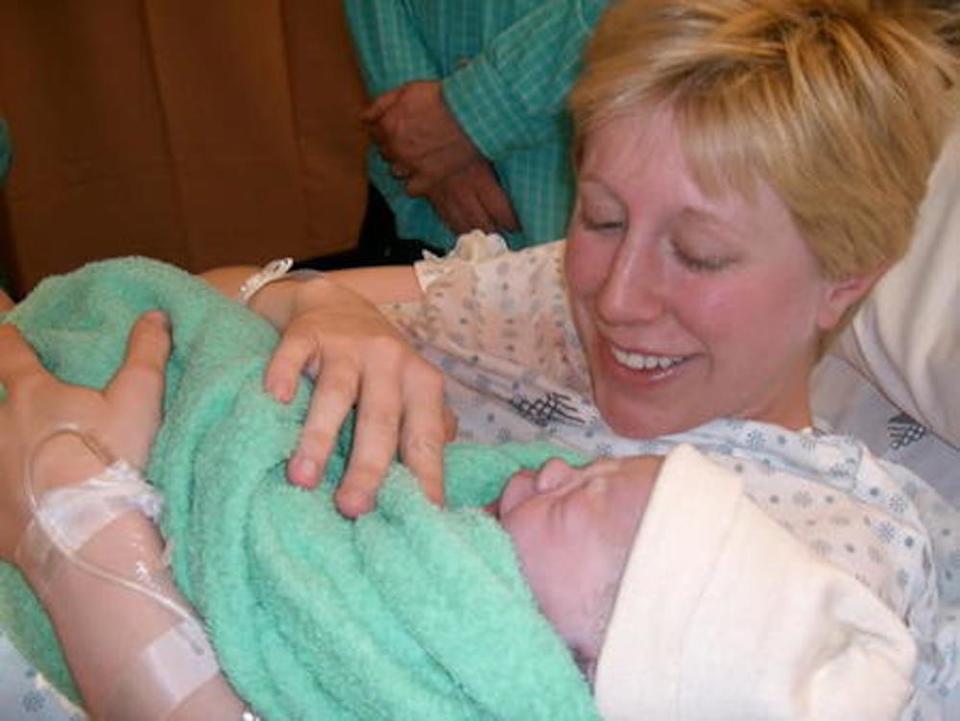I Was a Traditional Surrogate and This is What it Was Like

Scrolling through old photos on my phone, my breath hitched when I came across a picture of a little girl with light blonde hair, bright blue eyes, and a smile with dimples that match mine. In the picture, she was standing between her two dads and beaming. Staring into the eyes of that little girl—now a teenager—I couldn't help but think back to the day she was born. The day I gave birth for the first time and helped two men become fathers. The day my heart shattered and soared at the same time.
It was late December 2003 when Natalie* was born after nearly 48 hours of grueling labor. Her dads were in the room as she took her first breaths and her cries filled the room. I cried right along with her. I shed tears of relief that she was born; tears of tremendous pride that she was perfectly healthy; tears of heartache because she was biologically mine, but she wasn't mine. I gave birth as a traditional surrogate mother, meaning I used my egg to conceive and give birth to a baby for these two men to raise. Only 15 months later, I gave birth as a traditional surrogate mother once more to another healthy little girl, Daisy*.
In my early 20s, my maternal instinct kicked in, and I felt a strong urge to have a baby. As a young student, I knew I was in no position to become a parent. My desire to experience pregnancy was placed on the back-burner until I watched a news segment on surrogacy one evening. As I watched, I turned to my partner and said, "I want to do that." Shortly after, I placed an online ad on a surrogacy website to find intended parents to work with—not so different from the world of online dating profiles. It wasn't long before I connected with the gay couple who I would go on to help become parents. We hit it off immediately and within months, I was pregnant.
RELATED: I Was a Surrogate Mom of Quadruplets
As someone who was a surrogate mother before having my own children, my story is anything but common. Most surrogacy agencies and fertility clinics won't work with a woman unless she already has a child of her own. But because I pursued surrogacy without the help of a surrogacy agency or fertility clinic to facilitate the arrangement, I was able to throw convention to the wayside and act as a surrogate before becoming a mother myself.
Given the emotional and legal complexities around traditional surrogacy, it is less common than gestational surrogacy. Gestational surrogacy involves the surrogate carrying a child who is not genetically related to her. Even without working with a surrogacy agency or fertility clinic, my intended parents were diligent enough to hire lawyers. We had a contract in place to spell out expectations during the pregnancy and after, to make sure we were all on the same page. No amount of preparation can prepare intended parents or surrogates for the journey that lies ahead. It is a journey rife with emotion, even when things are going well.
In most traditional surrogacy arrangements, the surrogate is inseminated with the sperm of the intended father either at a fertility clinic through intrauterine insemination (IUI) or at home, "turkey baster" style. In both of my surrogacy arrangements, I got pregnant at home using a medicinal syringe in lieu of a turkey baster. Surprisingly, my intended parents passing me a cup of semen in the hallway was a lot less awkward than it sounds. In fact, it was a little humorous. I remember making a joke about the whole thing—a gay man passing some semen to a lesbian who had previously never come into contact with it.
RELATED: 19 Celebrities Who Used Surrogates
Thanks in part to being in my early twenties, I got pregnant within two months of trying to conceive for both surrogacies. Being pregnant with someone else's child is a surreal experience. Naturally, people in public would congratulate me once I began showing. One of the most frequent questions I've been asked (both during my pregnancies and after): "Did you get attached to the babies you carried?" I absolutely did. How could I not?
Even when I'm not pregnant, I'm driven by my emotions. With pregnancy hormones coursing through my veins, it was impossible to stay detached. I wanted the babies to feel my love and hoped they would carry that love with them as they went through their lives with their families. They were my constant companions as they grew in my womb, and I mourned their absence when they went home with their families.
Fortunately, my intended parents have kept in contact, and I have many memories with both Natalie and Daisy, particularly when they were younger. Now that they are teenagers, my surrogacy experiences feel like a surreal distant memory. I'm guilty of not visiting or getting in touch with them as much as I could. I now have a 6-year-old daughter of my own, and although she has many questions about her half-sisters whom she's met a handful of times, my surrogacies aren't really a part of the fabric of our day-to-day lives.
"Do you have any regrets?" is another oft-asked question I get from people. That's a hard one to answer. I don't regret the two lives I helped create. I find joy in knowing that there are two families raising beloved daughters because I was their surrogate. Most surrogates I know were also thrilled for their intended parents when the baby was born, even if they felt a sense of loss for a while, whether due to hormonal changes or grief in saying goodbye to the baby.
But the truth is, if I'd had my own children before pursuing surrogacy, I likely wouldn't have done it. As a young woman without children, I had no way of knowing exactly what I was giving up. Now that I'm a parent and truly enjoy motherhood, I'm certain I couldn't carry a baby and part with him or her ever again.
Becoming a surrogate is not an easy decision to make. It is perhaps even more difficult when you use your own egg to have a baby for someone else. Yet it changed everything about who I am. It changed my family. It changed my relationships with other people. It has impacted the way I parent, too—I never take any moments with my daughter for granted. And although surrogacy came with some grief for me, I feel a sense of peace and pride in knowing it changed the lives of the families I helped create.


